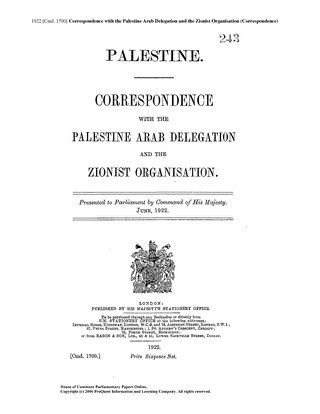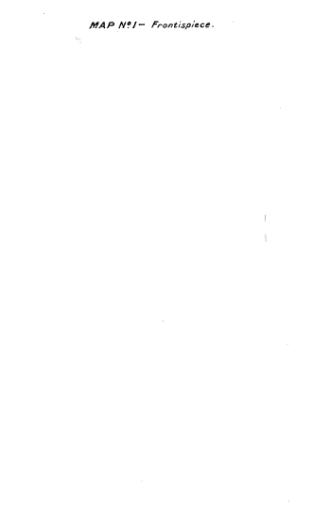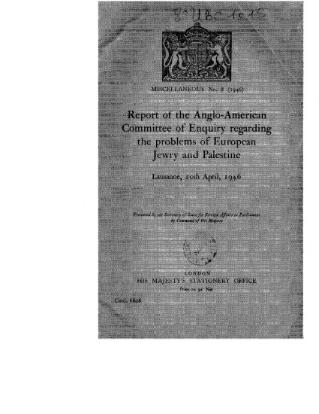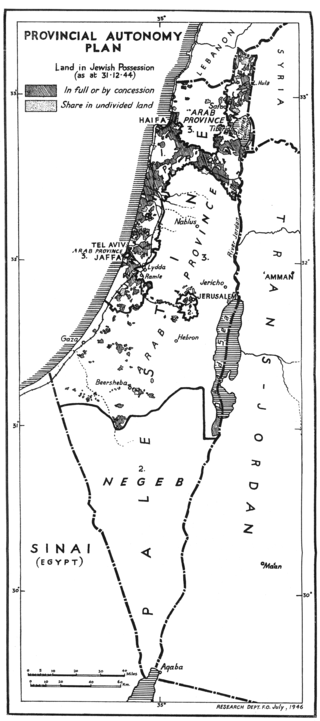
Zionism is an ethnocultural nationalist movement that emerged in Europe in the late 19th century and aimed for the establishment of a national home for the Jewish people through the colonization of Palestine, an area roughly corresponding to the Land of Israel in Judaism, and of central importance in Jewish history. Zionists wanted to create a Jewish state in Palestine with as much land, as many Jews, and as few Palestinian Arabs as possible.

The Jewish Agency for Israel, formerly known as the Jewish Agency for Palestine, is the largest Jewish non-profit organization in the world. It was established in 1929 as the operative branch of the World Zionist Organization (WZO).

The Churchill White Paper of 3 June 1922 was drafted at the request of Winston Churchill, then Secretary of State for the Colonies, partly in response to the 1921 Jaffa Riots. The official name of the document was Palestine: Correspondence with the Palestine Arab Delegation and the Zionist Organisation. The white paper was made up of nine documents and "Churchill's memorandum" was an enclosure to document number 5. While maintaining Britain's commitment to the Balfour Declaration and its promise of a Jewish national home in Mandatory Palestine, the paper emphasized that the establishment of a national home would not impose a Jewish nationality on the Arab inhabitants of Palestine. To reduce tensions between the Arabs and Jews in Palestine the paper called for a limitation of Jewish immigration to the economic capacity of the country to absorb new arrivals. This limitation was considered a great setback to many in the Zionist movement, though it acknowledged that the Jews should be able to increase their numbers through immigration rather than sufferance.

The Yishuv, HaYishuv HaIvri, or HaYishuv HaYehudi Be'Eretz Yisra'el were the Jewish residents in Palestine prior to the establishment of the State of Israel in 1948. The term came into use in the 1880s, when there were about 25,000 Jews living in that region, and continued to be used until 1948, by which time there were some 630,000 Jews there. The term is still in use to denote the pre-1948 Jewish residents in Palestine, corresponding to the southern part of Ottoman Syria until 1918, OETA South in 1917–1920, and Mandatory Palestine in 1920–1948.

The Peel Commission, formally known as the Palestine Royal Commission, was a British Royal Commission of Inquiry, headed by Lord Peel, appointed in 1936 to investigate the causes of conflict in Mandatory Palestine, which was administered by the United Kingdom, following a six-month-long Arab general strike.

The White Paper of 1939 was a policy paper issued by the British government, led by Neville Chamberlain, in response to the 1936–1939 Arab revolt in Palestine. After its formal approval in the House of Commons on 23 May 1939, it acted as the governing policy for Mandatory Palestine from 1939 to the 1948 British departure. After the war, the Mandate was referred to the United Nations.
The Woodhead Commission was a British technical commission established to propose "a detailed" partition scheme for Mandatory Palestine, including recommending the partition boundaries and examination of economic and financial aspects of the Peel Plan.

The Shaw Report, officially the Report of the Commission on the Palestine Disturbances of August 1929, commonly known as the Shaw Commission, was the result of a British commission of inquiry, led by Sir Walter Shaw, established to investigate the violent rioting in Palestine in late August 1929. The commission's report was issued in March 1930 and led to the establishment of the Hope Simpson Enquiry in May 1930.

Yehoshua Hankin was a Zionist activist who was responsible for most of the major land purchases of the Zionist Organization in Ottoman Palestine and Mandatory Palestine – in particular for the Sursock Purchase.

The Anglo-American Committee of Inquiry was a joint British and American committee assembled in Washington, D.C., on 4 January 1946. The committee was tasked to examine political, economic and social conditions in Mandatory Palestine and the well-being of the peoples now living there; to consult representatives of Arabs and Jews, and to make other recommendations 'as may be necessary' to for ad interim handling of these problems as well as for their permanent solution. The report, entitled "Report of the Anglo-American Committee of Enquiry Regarding the Problems of European Jewry and Palestine", was published in Lausanne, Switzerland on 20 April 1946.
The Passfield White Paper, issued October 20, 1930, by colonial secretary Lord Passfield, was a formal statement of British policy in Palestine, which previously had been set by the Churchill White Paper of 1922. The new statement resulted from the Hope Simpson Commission's investigation into the deeper causes of the 1929 Palestine riots, that initially started over access to the Western Wall. The white paper limited official Jewish immigration to a much greater degree.

During the British rule in Mandatory Palestine, there was civil, political and armed struggle between Palestinian Arabs and the Jewish Yishuv, beginning from the violent spillover of the Franco-Syrian War in 1920 and until the onset of the 1948 Arab–Israeli War. The conflict shifted from sectarian clashes in the 1920s and early 1930s to an armed Arab Revolt against British rule in 1936, armed Jewish Revolt primarily against the British in mid-1940s and finally open war in November 1947 between Arabs and Jews.

"Hebrew labor" and "the conquest of labor" are two related terms and concepts. One of them refers to the ideal adopted by some Jews in Ottoman and Mandate Palestine during the late 19th and early 20th centuries and later embraced by Zionism to favour hiring Jewish rather than non-Jewish workers. Another one is the slogan for the Jews to embrace productive labor rather than being engaged only in trades and professions.

Events in the year 1930 in the British Mandate of Palestine.

Dorothy Bar-Adon was an American-born Israeli journalist. Her early experience as a correspondent was gained on The Atlantic CityPress. From her immigration to Mandate Palestine in 1933 until her death she worked as a journalist for The Palestine Post, covering a wide range of international and domestic issues. She died at 43.

Mandatory Palestine was a geopolitical entity that existed between 1920 and 1948 in the region of Palestine under the terms of the League of Nations Mandate for Palestine.
This is a timeline of intercommunal conflict in Mandatory Palestine.

The One Million Plan was a strategic plan for the immigration and absorption of one million Jews from Europe, the Middle East, and North Africa into Mandatory Palestine, within a timeframe of 18 months, in order to establish a state in that territory. After being voted on by the Jewish Agency for Palestine Executive in 1944, it became the official policy of the Zionist leadership. Implementation of a significant part of the One Million Plan took place following the establishment of the State of Israel in 1948.

The Morrison–Grady Plan, also known as the Morrison Plan or the Provincial Autonomy Plan was a joint Anglo-American plan announced on 31 July 1946 for the creation of a unitary federal trusteeship in Mandatory Palestine.
The MacDonald letter, also known in contemporary Arabic sources as the Black Letter, was a letter from British prime minister Ramsay MacDonald to Chaim Weizmann on 13 February 1931 regarding the passage of the Passfield white paper, which recommended restrictions on Jewish immigration to Palestine, as well as Jewish purchases of land in Palestine. Zionist organizations worldwide mounted a vigorous campaign against the document, which culminated in MacDonald's "clarification" of the White Paper, reaffirming British support for the continuation of Jewish immigration and land purchase in Palestine. It was considered a withdrawal of the Passfield white paper, despite the fact that Prime Minister stated in parliament on 11 February 1931 that he was "very unwilling to give the letter the same status as the dominating document" i.e. the Passfield white paper. The letter itself also claimed the importance of justice for "non-Jewish sections of the community".














